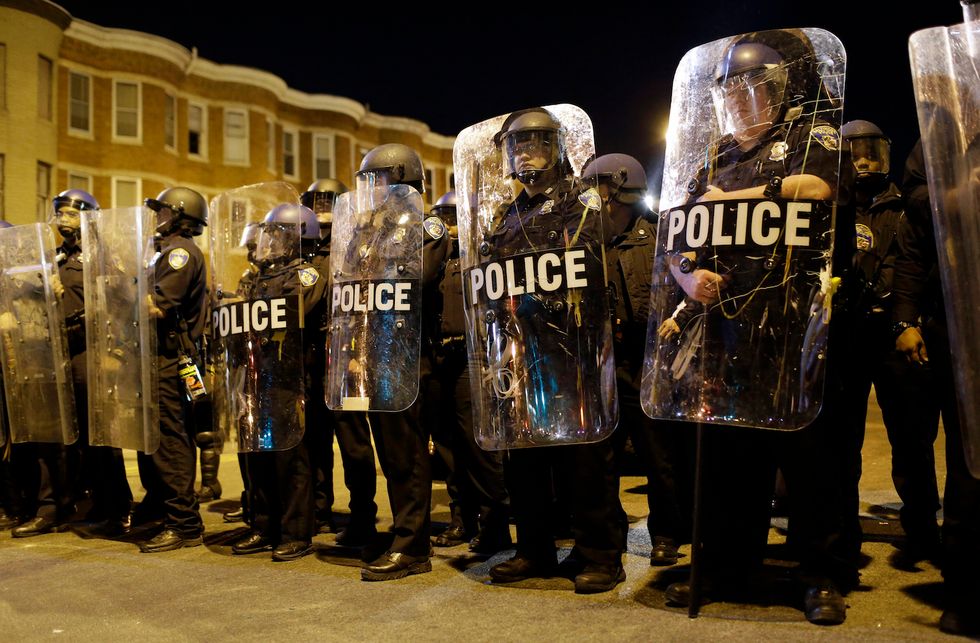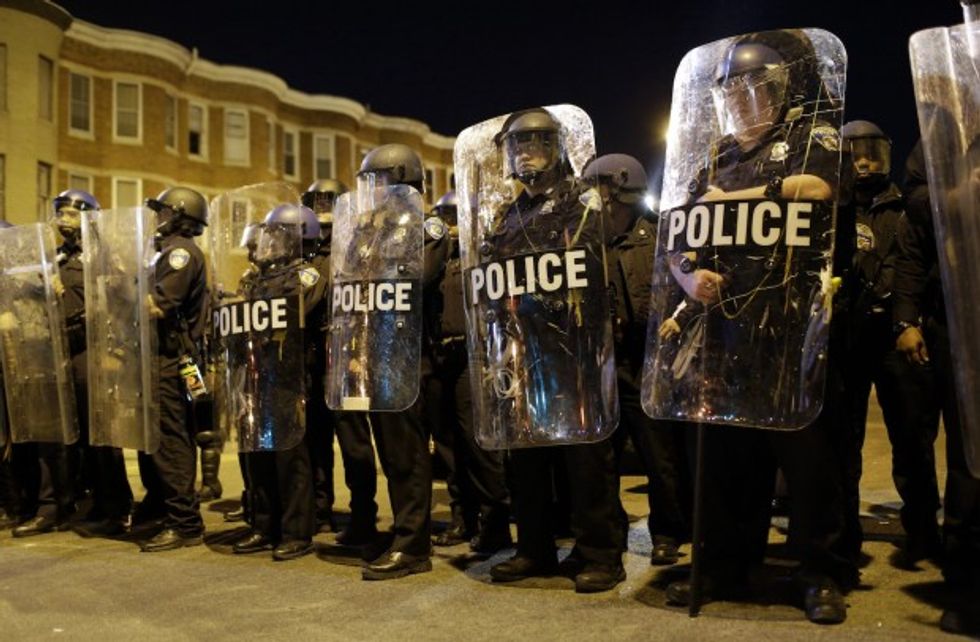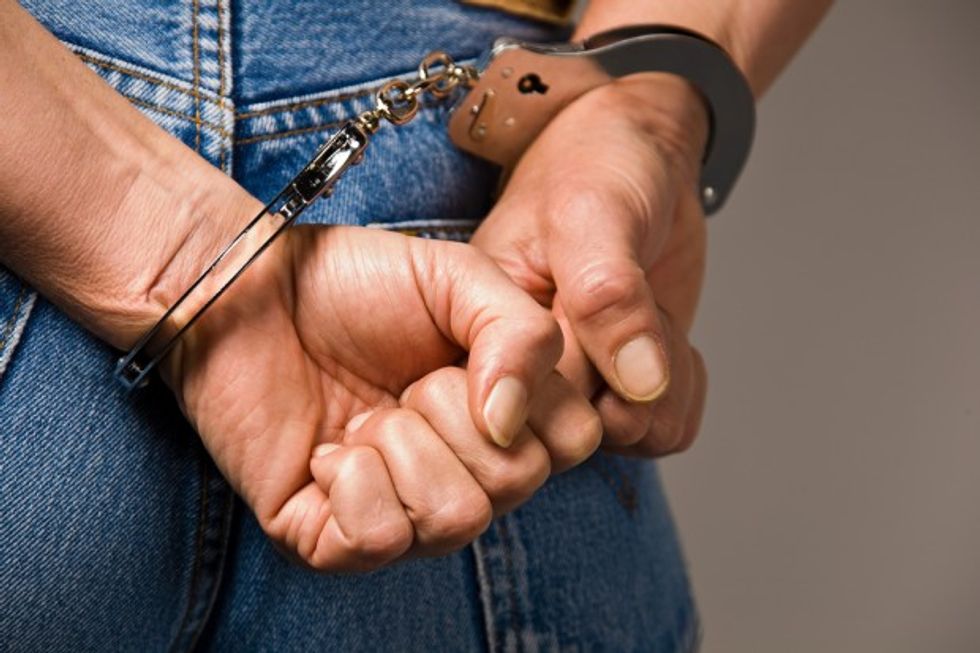
Police stand in formation as a curfew approaches, Tuesday, April 28, 2015, in Baltimore, a day after unrest that occurred following Freddie Gray's funeral. (AP Photo/Patrick Semansky)

Police officers are more likely to be struck by lightning than be held financially accountable for their actions.—Law professor Joanna C. Schwartz (paraphrased)
If you can be kicked, punched, tasered, shot, intimidated, harassed, stripped, searched, brutalized, terrorized, wrongfully arrested, and even killed by a police officer, and that officer is never held accountable for violating your rights and his oath of office to serve and protect, never forced to make amends, never told that what he did was wrong, and never made to change his modus operandi, then you don’t live in a constitutional republic.
You live in a police state.
It doesn’t even matter that “crime is at historic lows and most cities are safer than they have been in generations, for residents and officers alike,” as the New York Times reports.
What matters is whether you’re going to make it through a police confrontation alive and with your health and freedoms intact. For a growing number of Americans, those confrontations do not end well.

Making matters worse, in the cop culture that is America today, the Bill of Rights doesn’t amount to much. Unless, that is, it’s the Law Enforcement Officers’ Bill of Rights (LEOBoR), which protects police officers from being subjected to the kinds of debilitating indignities heaped upon the average citizen.
Most Americans, oblivious about their own rights, aren’t even aware that police officers have their own Bill of Rights. Yet at the same time that our own protections against government abuses have been reduced to little more than historic window dressing, police officers accused of a crime are being given special due process rights and privileges not afforded to the average citizen.
In other words, the LEOBoR protects police officers from being treated as we are treated during criminal investigations: questioned unmercifully for hours on end, harassed, harangued, browbeaten, denied food, water and bathroom breaks, subjected to hostile interrogations, and left in the dark about our accusers and any charges and evidence against us.
Not only are officers given a 10-day “cooling-off period” during which they cannot be forced to make any statements about the incident, but when they are questioned, it must be “for a reasonable length of time, at a reasonable hour, by only one or two investigators (who must be fellow policemen), and with plenty of breaks for food and water.”
Among the most common rights afforded police officers accused of wrongdoing are the right to be given a heads up about a complaint, have one’s accusers identified, have the complaint reviewed by a hearing board made up of one’s fellow officers, not be disciplined if more than 100 days have passed since the incident, and have one’s salary, benefits, as well as the cost of the officer’s attorney paid for by the police department.
It’s a pretty sweet deal if you can get it, I suppose: protection from the courts, immunity from wrongdoing, paid leave while you’re under investigation, and the assurance that you won’t have to spend a dime of your own money in your defense. And yet these LEOBoR epitomize everything that is wrong with America today.

Once in a while, the system appears to work on the side of justice, and police officers engaged in wrongdoing are actually charged for abusing their authority and using excessive force against American citizens.
Yet even in these instances, it’s still the American taxpayer who foots the bill.
For example, Baltimore taxpayers have paid roughly $5.7 million since 2011 over lawsuits stemming from police abuses, with an additional $5.8 million going towards legal fees. If the six Baltimore police officers charged with the death of Freddie Gray are convicted, you can rest assured it will be the Baltimore taxpayers who feel the pinch.
New York taxpayers have shelled out almost $38 million every year to address charges of misconduct against NYPD officers. Chicago taxpayers were asked to pay out nearly $33 million on one day alone to victims of police misconduct.
That’s just a small sampling of the most egregious payouts, but just about every community—large and small—feels the pinch when it comes to compensating victims who have been subjected to deadly or excessive force by police.
The ones who rarely ever feel the pinch are the officers accused or convicted of wrongdoing. Indeed, 99.8 percent of the monies paid in settlements and judgments in police misconduct cases never come out of the officers’ own pockets.
For instance, Kathryn Johnston, 92 years old, was shot and killed during a SWAT team raid that went awry. Attempting to cover their backs, the officers falsely claimed Johnston’s home was the site of a cocaine sale and went so far as to plant marijuana in the house to support their claim. The cost to Atlanta taxpayers to settle the lawsuit: $4.9 million. The amount the officers contributed: 0.
If you want a recipe for disaster, this is it: Take police cadets, train them in the ways of war, dress and equip them for battle, teach them to see the people they serve not as human beings but as suspects and enemies, and then indoctrinate them into believing that their main priority is to make it home alive at any cost. While you’re at it, spend more time drilling them on how to use a gun (58 hours) and employ defensive tactics (49 hours) than on how to calm a situation before resorting to force (8 hours).
Then, once they’re hyped up on their own authority and the power of the badge and their gun, throw in a few court rulings suggesting that security takes precedence over individual rights, set it against a backdrop of endless wars and militarized law enforcement, and then add to the mix a populace distracted by entertainment, out of touch with the workings of their government, and more inclined to let a few sorry souls suffer injustice than challenge the status quo or appear unpatriotic.
As I point out in my new book "Battlefield America: The War on the American People," when all is said and done, the various problems we’re facing today—militarized police, police shootings of unarmed people, the electronic concentration camp being erected around us, SWAT team raids, etc.—can be attributed to the fact that our government and its agents have ceased to see us as humans first.
Then again, perhaps we are just as much to blame for this sorry state of affairs. After all, if we want to be treated like human beings—with dignity and worth—then we need to start treating those around us in the same manner.
–
TheBlaze contributor channel supports an open discourse on a range of views. The opinions expressed in this channel are solely those of each individual author.